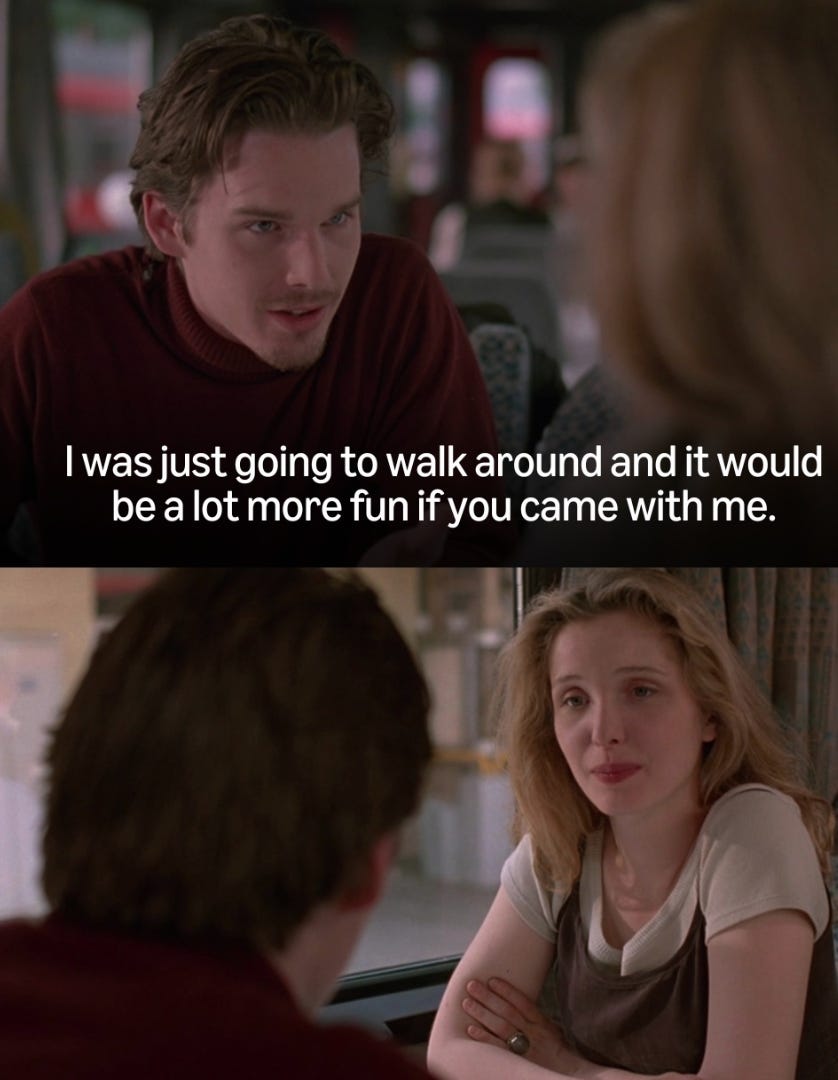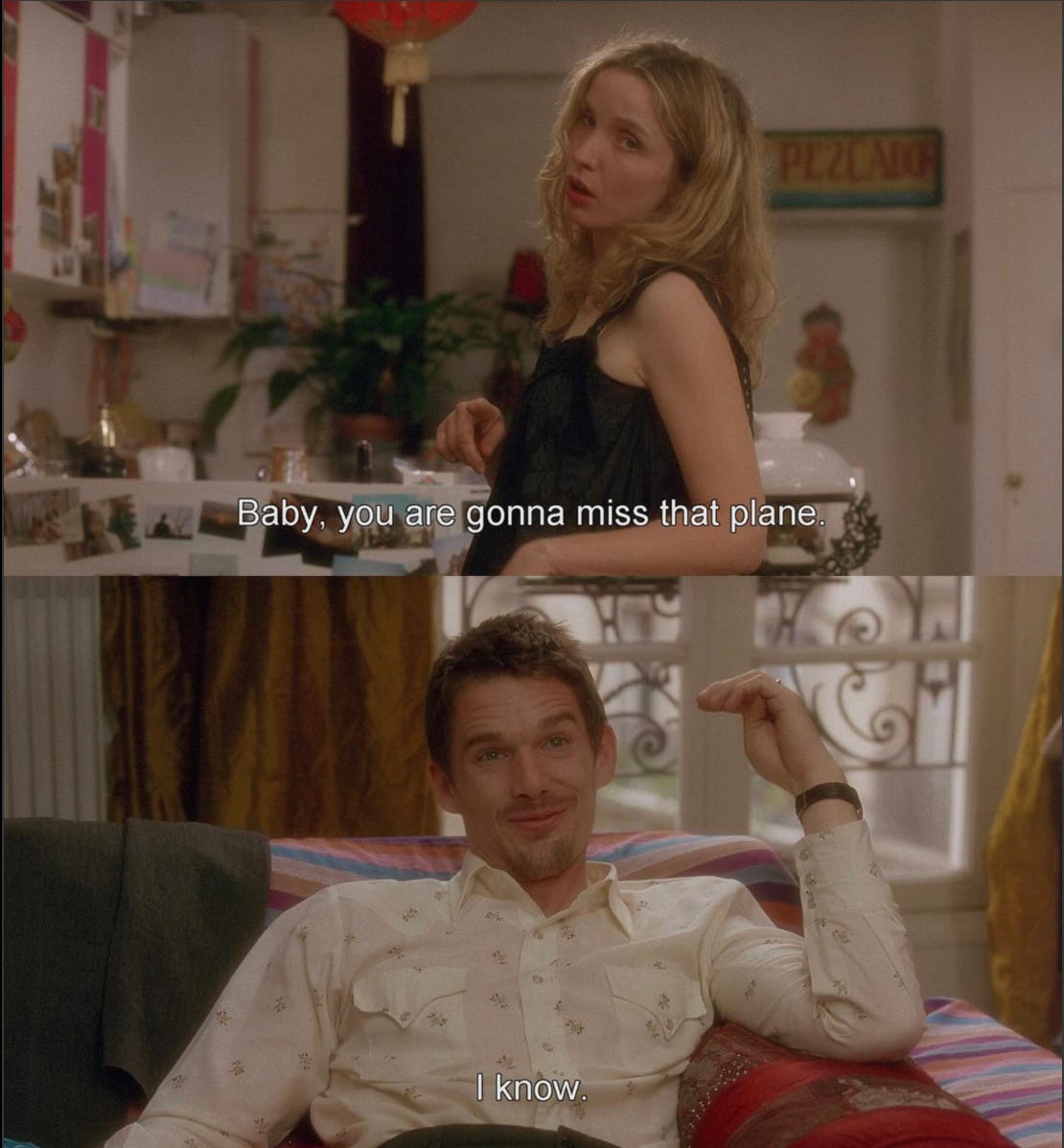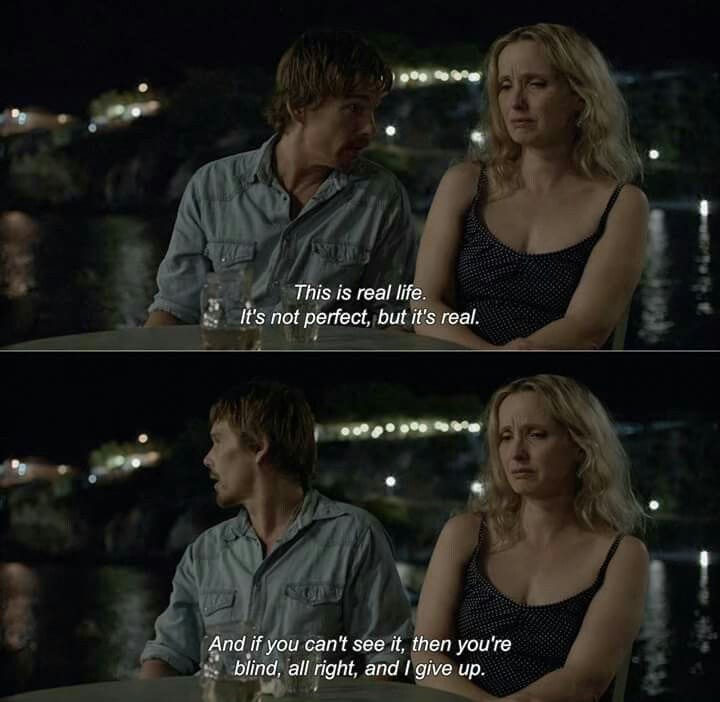How Linklater lied to you
On lamentations and leaving
Richard Linklater was inspired to write Before Sunrise after meeting a woman in a Philadelphia toy shop and wandering with her deep into the night. As a college freshman enamored with the possibility of finding a gorgeous Bataille-reading blonde out and about I always wondered: is this a real thing that happens? A momentary connection with a beautiful woman that evaporates just as quickly as it began?
In junior year of college I spotted a woman in my campus dining hall with a bag that said “I would prefer not to”, the famous quote from Bartleby the Scrivener. I gave her a quick compliment and went downstairs to one of the tertiary dining rooms. It turned out she was sitting at the table next to me by herself. I asked to join her.
We spent that evening walking around campus and conversing until around one in the morning. We went to my dorm room to talk some more and she left at about three because she had a flight the next morning.
Except she didn’t miss her plane. She left. She didn’t give me her number. She didn’t have Instagram. I woke up the next morning in a haze of regret and melancholy and then went to class that morning on three hours of sleep feeling like I had this ineffable secret. I didn’t feel like I shouldn’t tell anyone. I felt like I couldn’t tell anyone. How do I explain this feeling to someone?
“I can have all this inside me and to you it’s just words.”
-David Foster Wallace, The Pale King
“Everybody knows that the best way to describe
the ocean to a blind man is to push him in”
-Mike Kinsella, “Everyone is Dressed Up”
I walked away from that night knowing very little about her, just where she worked (her job at the time was exactly the job I had one winter break between college semesters) and her name. I’m embarrassed to say I attempted to stalk her LinkedIn which I found had not been updated since 2021. In my (what could generously be called) research I found a video of her playing “Let It Be” on ukulele. It was strange seeing her through a computer screen when she had been right next to me talking about the beauty of the Arabic language just hours earlier.
Two years later I happened to be traveling to the city where she told me she worked. On my first day there, I took an Uber to her workplace to find she had quit sometime in the last year. Funnily enough her sister worked at the same place and I was able to talk to her to no avail. The sister was kind but I made no headway. I left defeated.
Before Sunrise’s optimistic wish-fulfillment for every lonely college boy that he may meet a beautiful girl reading Bataille on a train to Budapest is not just pure fantasy. It happened to me and it could happen to you. She was not reading Story of the Eye, but teaching a ballroom dance class that evening which, after spending several hours together, I attended. She taught me a few steps just the two of us before the class.
Ships that pass in the night, and speak each other in passing,
Only a signal shown and a distant voice in the darkness;
So on the ocean of life we pass and speak one another,
Only a look and a voice, then darkness again and a silence.
-Henry Wadsworth Longfellow, Tales of Wayside Inn
Before Midnight is not fantasy either. It’s the most true-to-life film in the trilogy. It finds Jesse and Céline well into the years of kids and middle-age grasping at what they still love about each other and loved about each other before. The film ends not with joy or regret but content resignation. The honeymoon period has long been over and life is just life with all its disappointments and mundanities.
But Before Sunset is deceptive. The girl of your dreams does not go out of her way to find you several years later. She moves on and you move on. In the real world people live their lives and do other things because one great evening is not something to run after for the rest of your time on this Earth.
It’s not just that Before Sunset is naively optimistic, it isn’t something to aspire to. Imagine chasing a fleeting emotion you felt one night and making it some sort of raison d’être in your mind. I don’t have to imagine. I did chase it for a while and all it left me feeling was cold and disappointed. Life is not about pursuing the chemtrails of a brief dopamine high. It’s about the disappointments and mundanities. Without them we can’t appreciate the contentment the comes day by day as we make our own individual lives.
That woman Linklater met in Philadelphia? She died tragically in a motorcycle accident before the release of Before Sunrise. Linklater has been largely private about her because he has felt uncomfortable making something so intimate an object of media fascination.
The Before Trilogy tells us that the endurance of nights like the one in Before Sunrise, like the ones both I and Richard Linklater had, is not in the preservation of the relationship itself. It’s in the preservation of the feeling, the knowledge that two people can affect each other in such a way in such a short period of time. People have that power and knowing that, although it will likely never happen to me again in the same way, teaches you someone can affect you like that and you can affect them. And what else matters?




